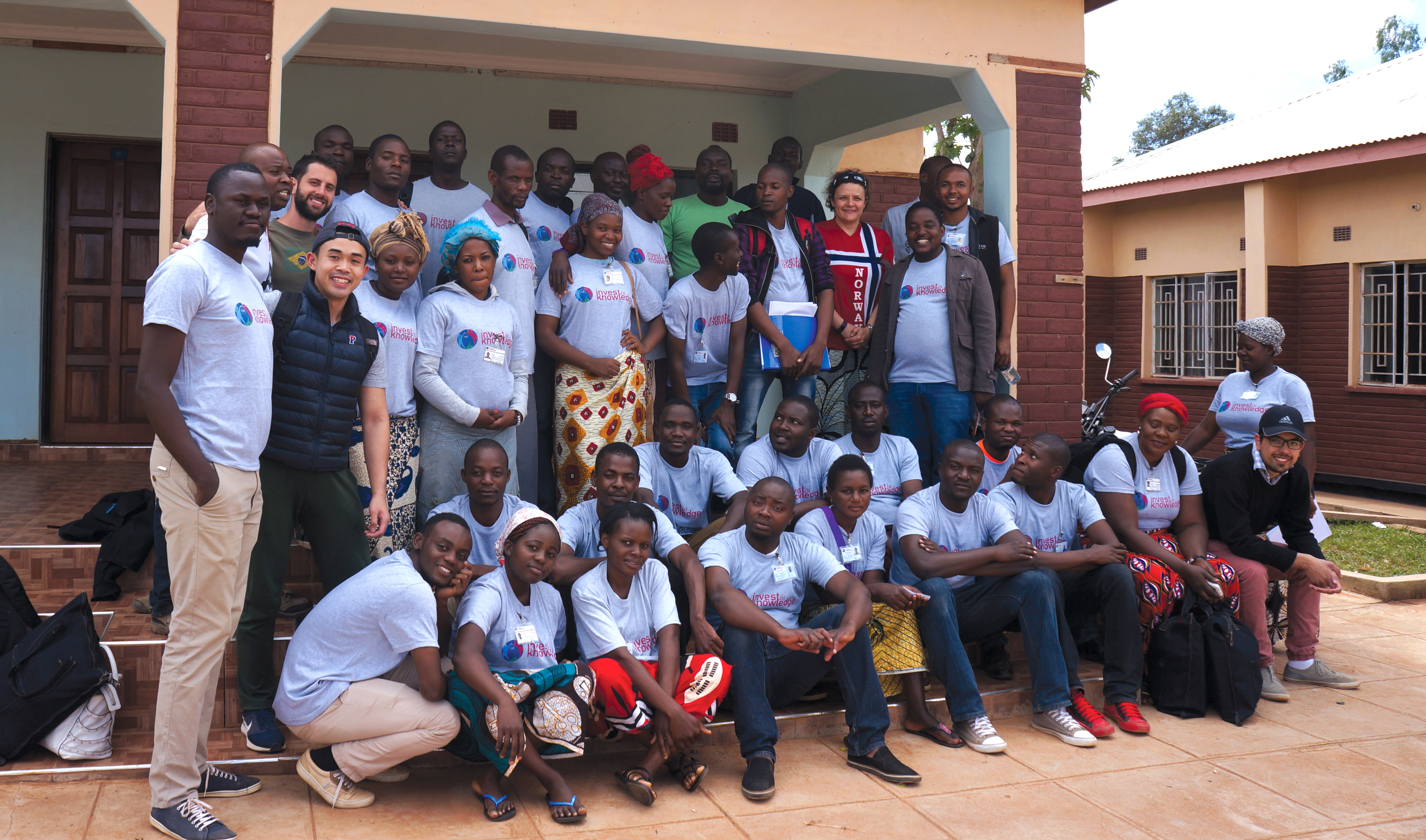Surviving an Epidemic: Charting Trends and Resilience in Sub-Saharan Africa
Using recurring, extensive survey data collected in Malawi over two decades, Kohler and his team are able to explore respondents’ earlier-life decisions, access to information, and perceptions of their own and others’ health, along with dozens of other factors. These data allow insight into pressing social, epidemiological, and demographic questions: how members of the community—individually and collectively—cope with shocks such as disease and famine, and how families and communities build resilience.
When he first got involved in the project, Kohler was a recent graduate from the University of California at Berkeley in the late 1990s. Susan Watkins, then a professor of sociology at Penn (now Professor Emerita), had an interest in social networks, risk behaviors, and fertility decline in high-risk HIV populations, and she was establishing the survey that became the MLSFH. She then invited Kohler and Jere Behrman, now William R. Kenan Jr. Professor of Economics, to head the MLSFH.
“We never thought at the time we'd be collecting data 20 years down the road,” says Kohler.
Currently, the team is pursuing three main initiatives: Surviving an Epidemic: Families and Well-Being in Malawi, 1998–2021 (in collaboration with Philip Anglewicz, Tulane University); Adverse Childhood Experiences and Adolescent HIV Risk (in collaboration with Rachel Kidman, Stony Brook University); and Aging Against the Odds: Health and Well-Being Among Mature Adults in a Low-Income Population (in collaboration with Iliana V. Kohler).
So far, the MLSFH has collected survey data in 1998, 2001, 2004, 2006, 2008, 2010, 2012, 2013, and 2017, along with a wealth of qualitative studies and ethnographic journals that complement the extensive survey data and provide in-depth insights to the local context.
Throughout, the MLSFH has been at the frontier of data collection methodologies: the project was among the pioneers of collecting data on social networks and subjective expectations, and it was among the first offering door-to-door HIV testing and other health-related services to residents. MLSFH fieldwork in Malawi is an important training experience for students. For many years, groups from Penn, including faculty, Ph.D. students, and, sometimes, undergraduate students have traveled to Malawi to collaborate with local partner organizations.
How the Poor Cope With Crises
To illustrate the current MLSFH research theme, Surviving an Epidemic, we follow Kohler through the life of one of the MLSFH study participants: Estere (name changed).
Estere is 57 years old, an age just shy of the current life expectancy in Malawi, and HIV positive. She is one of the 775 respondents for whom the MLSFH collected data seven or more
times from 1998 to 2017.
Longitudinal data for participants like Estere is invaluable to the research. “We’re investigating the factors that might have predicted one family doing relatively well during the AIDS epidemic, as compared to individuals and families who were devastated,” says Kohler.
In 1998, Estere had been married to her then-husband for five years. She had already given birth to five children, but only three remained alive. She didn't use contraception at the time as she wanted to have additional children, but she had heard about modern family planning on both the radio and from clinics. She “worried a lot” that she herself might contract AIDS, and considered an infection through her husband as the most important worry. Yet, it was not considered acceptable to use a condom in marriage, and access to other forms of contraception was scarce.
“While she had talked with her spouse about HIV/AIDS, something many other women in the area in 1998 hadn’t done, she had not talked to others about HIV risks and prevention strategies,” says Kohler. “This had changed by 2001, when she had talked to at least two other women, both of whom she considered at least somewhat knowledgeable about HIV/AIDS.”
By 2012, Estere was infected with HIV, had given birth to one additional child, and her husband had passed away. Her health had somewhat deteriorated and she had no savings for the future. Her household had been affected during the previous two years by multiple shocks, including deaths and illness of household members, poor crop yields, and income loss.
“Estere is member of the remarkable cohort that is reaching middle and older ages in sub-Saharan African countries affected by the HIV epidemic,” says Kohler. “Some members of this cohort were infected with HIV, but everybody was affected by HIV.”
Aging Against the Odds
Social and health implications of reaching old age have to date primarily been studied in high- and, increasingly, middle-income countries where the aging of the population is a defining aspect of demographic change. Sub-Saharan Africa harbors the most rapidly growing population of older individuals; however, a dearth of population-based data on older individuals severely limits policy-relevant research on health and aging in the region.
The MLSFH is an exception: it provides a unique opportunity to study older individuals, including long-time MLSFH respondents such as Estere, and to investigate the health, social, and demographic changes that occur with aging among individuals who often experienced lifelong exposure to adversity—poverty, undernutrition, exposure to infectious diseases, a potential HIV infection, mortality or morbidity among family members, among others.
Findings so far include that mature adults have high levels of economic activity in low-income contexts such as Malawi, and they make significant contributions to families and society at large, despite health limitations. The social acceptance of older persons, including elderly with HIV, is often centered on the ability to perform broadly defined “work”; those who can’t are often excluded. Despite the importance of work, however, the well-being and productivity of older individuals is often low, due to poor health and depression.
Improving the Next Generation's Resilience
At the other end of the age spectrum, the MLSFH provides a lens with which to study the next generation and how current adolescents fare as they approach adulthood and face a new set of challenges. A rapid transition to adulthood—defined as a dense set of life-course events, like onset of sexual activity, first marriage, and dropping out of school—occurs in Malawi often between ages 15 and 18 years and is associated with elevated HIV risk.
“We ask a set of questions trying to glean what determines HIV risk and the set of related outcomes in this critical transition to adulthood, trying to differentiate between adolescents and the HIV risk they face based on the richness of what we know about these children,” says Kohler.
Examples of childhood adversity are divided into “ecological” levels. On an individual level, participants are asked about emotional, physical, and sexual abuse. When it comes to the family experience, factors like parental HIV infection and poverty are key. Peer interaction, such as bullying or violence, is also examined, as well as communal dangers like natural disasters.
“The study of the next generation will shed light on observed trends from the past—trends that are sometimes surprising,” says Kohler.
A Vast Network of Collaboration
The MLSFH has had a prominent role in training the next generation of scholars in a broad range of topics, and it isn’t slowing down. In the next five years, the hope is to establish and publicly release a unique data set for analyzing a broad range of topics. New data will be collected on all surviving members of the MLSFH cohort, as well as some of their children. The topics to be covered include everything from mortality and family and household dynamics to social capital and intergenerational relations. Household and individual data will be complemented by census linkages, village-level and other ecological data, and extensive ethnographies to provide context, assess data quality, and yield insights into perceptions and behaviors underlying the surviving of an epidemic.
“To cope with new crises, citizens of low-income countries will have to rely on multiple and often innovative mechanisms that rely on the unique set of resources that they have at their disposal,” Kohler says.
To learn more about the Malawi Longitudinal Study of Families and Health, visit the project website at malawi.pop.upenn.edu.
Photo credits: Hans-Peter and Iliana Kohler





